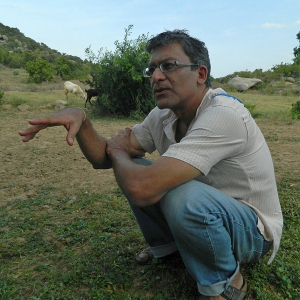NOTE: Images in this archived article have been removed.
In Resilience Reflections we ask some of our contributors what it is that inspires their work, and what keeps them going.
Read more Resilience Reflections here including Adrian Ayres Fisher and Courtney White.

Rahul Goswami has worked on a food and agriculture programme (livelihoods and rural economies) of the Government of India since 2009, is a trainer in the Asia-Pacific region for UNESCO’s 2003 Intangible Cultural Heritage Convention, and lives in Goa, India.
Who/what has been your greatest inspiration? And why?
No single person but a group of persons who lived not all at the same time, but during the period 1850 to around 1940, in India. These were the people who felt strongly that India must win independence from what were then the British colonists, and who followed that conviction with action to which they devoted their lives, and some of them gave up their lives for it. Some of those men and women are nameless, but are heroines and heroes nonetheless, for they served the freedom struggle knowing not whether its successful end would come in their lifetimes. That I think was an outstanding nationalism.
Knowing what you know now about sustainability and resilience building, what piece of advice would you give your younger self if you were starting out?
That it will take very much more time than you think it will! Looking back – partly with regret about what I could have approached differently, partly with bewilderment about how we found the will to press on – what one imagines can take a few years does in fact take at least a generation, and then only if the conditions are right. My advice would also be that ‘sustainability’ and ‘resilience building’ are foreign words, uncomfortable ones at that, for those who have entered income strata in which consumption can take place in the way that the market has designed it. Individual, household and collective responsibility for actions are not popular concepts because they can tend to get in the way of aspirations, and when some of these aspirations have been shaped by shortages – whether of food, income, shelter, opportunity, education and so on – then it is extraordinarily challenging to find ways to rein them in. That’s the part that requires a long view, which doesn’t suit our younger and impatient selves!
What keeps you awake at night?
Some of the work I do is for Unesco, and in particular Unesco’s convention on intangible cultural heritage. It is a complex term, and there is much in common with traditional (or indigenous) knowledge and also with traditional cultural expressions. In this domain that goes by many names, there are knowledge systems (as we commonly call them) whose insights and subtleties are still only dimly understood. There are sub-dialects and linguistic glosses used for them whose very existence we may be unaware of. And what keeps me awake at night is the acute scare that the global rush towards ‘modernity’ is trampling upon these wondrous but fragile worlds, pushing them closer to extinction with each passing day.
What gets you up in the morning or keeps you going?
Other than the promise of an excellent cup of strong South Indian coffee? The desire to put this accumulation of experience, however rude and mis-shapen it might be in parts, to good use so that one less field becomes pavement, so that one less stream dries up, that one less meaningful cultural practice fades away in an urban slum, and so that one less barrel of oil is burned just because a way of life deems that burning as inevitable.
What has been your biggest setback and how did you recover?
Not knowing my grand-parents well enough. I have never recovered.
For you resilience is…?
A culturally articulated view of the manner in which one lives, and so the responsibilities that become implicit are no longer burdens that require sciences to explain, instead they are effortless practices recalled through prayer and contemplation, via cooperation and sharing, reinforced through learning and respecting our natural boundaries.
What one social/political/cultural/policy change would most assist your work/hopes/dreams?
Political change is (has been for so long) a mirage. Policy has been hijacked by the macro-economists, by legions of scientists and by the technopreneurs of our time. Culture has tended unfortunately to veer more towards being a force exploited by the market than being a primary article of identity, and because of this stress is much less a force for healing and for rejuvenation than it could be. That leaves social transformation, and the change that would make, if adopted in a more widespread manner, the difference is what we in India call ‘dharma’. That is, a society whose households and families (for these are the units of a dharmic society, not individuals) conduct themselves in ways that respect and preserve rather than abuse and exploit.
What gives you hope?
The evidence that there are many more such motes of light than there were even ten years ago!
What book/film/other resource has most supported your work?
The accounts of the way knowledge – its sources, meanings and mastery – was considered in my country in ages past, for these sublime efforts have guided our way for centuries.








